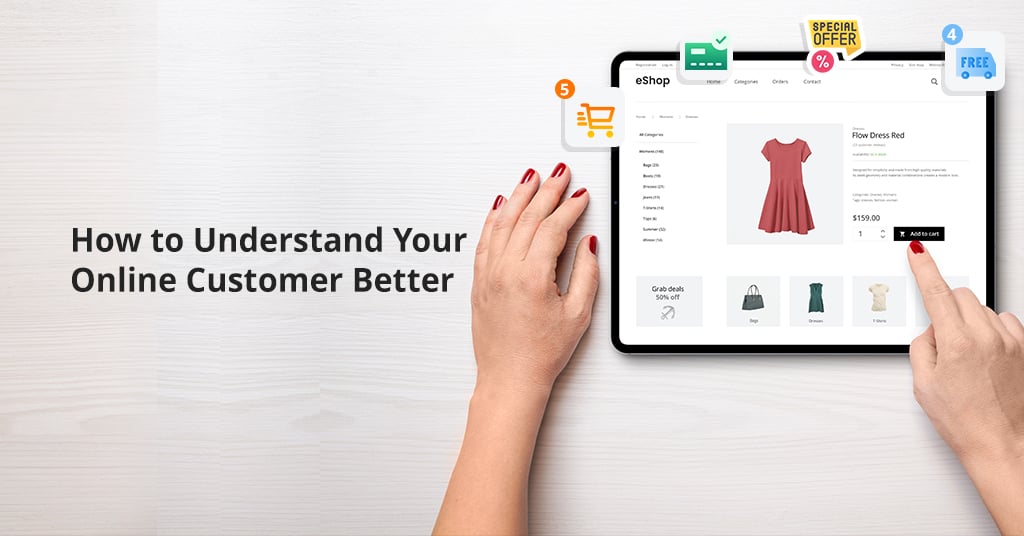A key step toward ensuring customers return to a website involves creating an unforgettable customer experience. For an e-Commerce business, sustainability begins with a casual visitor who may stay and explore a website out of curiosity or complete a purchase.
For visitors, the web browsing experience can influence the decision to stay and browse or leave the website. According to a WARC report, excellent customer experience is critical and includes the consideration of free delivery, free returns, and extended satisfaction guarantees. Since online shoppers cannot feel or touch a product before purchase, the delivery moment also holds the potential to delight or disappoint. In a survey, customer experience remained a top priority in digital transformation among the respondents (50 percent in the last 2 years, 2020 and 2021).
The link between customer experience and lead conversion
For e-Commerce, web development is critical to business sustainability. A strong web presence can spur the growth of customers, returning customers, and referrals. Lead conversion is the process of converting leads into paying customers. Like with a traditional business or a store, visitors will stay back to find out more if they are happy with what they see during their first visit. If the overall shopping experience is positive, they are more likely to return for a second purchase and recommend the business in the form of referrals.
Customers are central to the process of selling and conducting business in any industry, including e-Commerce. Understanding what the customer requires and being able to address this requirement can help businesses sell better. Replicating this process of promptly understanding and addressing customer demand will ensure the customer’s return while encouraging patronage and loyalty. In the case of e-Commerce businesses, a positive customer experience can help lead to better conversion.
Lead conversion is essential for businesses to earn and expand their revenue. However, leads and lead generation require work. This is especially true for e-Commerce businesses that constantly require visitor engagement to convert into sales and returning sales.
How to understand your online customer better
Customer attitudes and online behavior is a result of multiple factors, including content from media sources, social media, other similar and competitor websites, etc. This information can be a goldmine for businesses to design and tailor content to help guide online visitors to their websites and eventually convert them into buyers. Understanding customer behavior is crucial to help marketing efforts become successful and ensure communication that is aligned with business growth goals and sustainability plans.
Here are some ways in which businesses can understand online customer bases better and align their needs with the needs, interests, and expectations of these customers.
- Traversing your customer’s path
The process of surveying a customer’s path by using technology can help determine the likes, dislikes, and interests of your customers. Information such as transaction and browsing history and conversations can help identify and determine these customers’ areas of interest. Analyzing the relevant data can help businesses understand why customers prefer a particular brand or product and service over another. This can also help customize better deals for them.
- Applying intelligent customer engagement
Intelligent customer engagement not only tracks and follows customer actions, but also helps businesses engage and capture the attention of browsing visitors and existing customers. This engagement is aimed at helping ensure customers have a memorable browsing experience while also shopping and completing their purchases. Intelligent engagement can also help businesses understand what motivates their customers to better understand their online behavior.
- Creating more robust buyer personas
By creating a buyer persona, you can help provide your business with a representation of the ideal customer drawn through research. When aligned with a target audience, buyer personas can help the business reach out to and attract visitors who convert into customers.
A robust buyer persona is critical to driving sales and marketing, content, and high-value leads to the business. Buyer personas also drive business goals for customer retention, to help ensure returning customers.
Building customer understanding into business strategy
Does your business need dedicated firewalls? Is there a need for backups done at specific periodic intervals? Does your business need global customer assistance or data centers? What are the maximum applications the business cloud platform will need to launch?
These and similar questions may form the basis of successful lead conversions via appropriate software deployment.
The act of partnering with professionals, especially those specializing in e-Commerce web development services, can ensure accuracy in assessing current processes while helping to suggest the right changes. Professionals can also help businesses decode technical software, match offered features to current requirements and help deploy the right solutions.
In turn, this helps businesses avoid:
- Loss of time and money
- Delays that may come with incorrect assessments of problem solutions
- Loss of existing and returning customers
- Loss of potential leads conversions
- Loss of trust and goodwill
- Threats to business sustainability.
Choosing professionals allows e-Commerce businesses to:
- Identify problem areas in the existing strategy and choose suitable resolutions
- Assess and choose the correct software tools
- Help free up time for owners and operators to pursue critical business-building and revenue-generating activities
- Ensure better software deployment and robust tech support.
Professional assistance can:
- Help e-Commerce businesses review and understand data analytics to complement their understanding of target audience expectations.
- Help track target audience behavior to guide e-Commerce efforts to deliver relevance.
- Guide higher profitability for the business by developing and deploying an effective lead conversion strategy.
Next Steps
- Analytix Solutions offers robust and reliable e-Commerce solutions from various commercial offerings, including WooCommerce web development. Learn more about the benefits of professionally managed e-Commerce stores. Assess and deploy solutions best matched to your business.
- Email us at sales@analytix.com or call us at 781.503.9003 today.
- Follow our blog for industry trends and the latest updates.
- Engage with us on LinkedIn and Twitter.
